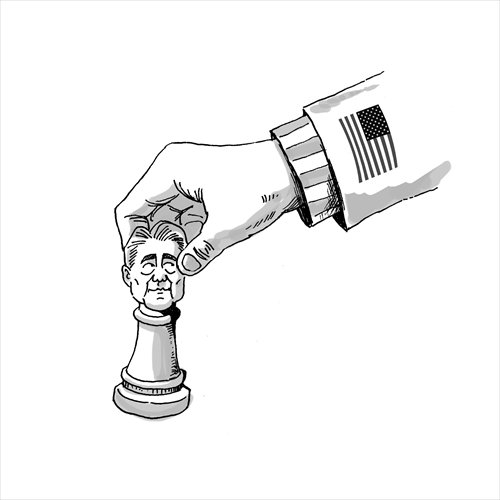


Illustration: Liu Rui/GT
Japanese Prime Minister Shinzo Abe will embark on an eight-day visit to the US beginning on April 26 and tour Boston, Washington, San Francisco and Los Angeles. He has also been invited to address the joint session of the US Congress on April 29, the first Japanese leader to do so. There has been no speech delivered by a Japanese prime minister in either House since Hayato Ikeda in 1961.
The trip obviously carries strategic implications. The last time a Japanese prime minister officially visited the US was Junichiro Koizumi in 2006. Abe is the longest lasting prime minister since then and is hopeful of keeping his grip on power. The US invitation can be taken as a sign of approval of Abe since Washington is always willing to see a Japanese cabinet that can prioritize the US-Japan alliance and stick in office.
The US needs increased support from Japan for its pivot to Asia strategy in terms of security and economic cooperation to ease some of its burden and lessen the cost. This is particularly true in the US involvement in the Asia-Pacific regional cooperation.
Besides, Washington has to coordinate its allies for its Asia-Pacific strategy as Japan-South Korea relations have been frayed by Abe's frequent attempts to distort history and revise the pacifist constitution. The US also needs to keep exchanges with Japan on war-related issues in the 70th anniversary of the end of WWII to caution Abe over his nonsensical remarks that will trigger unnecessary diplomatic disputes. This is both a gesture and an obligation that the US has to take as a super power.
From Japan's perspective, Abe has his own calculations as well.
By visiting the US, he can showcase the solid US-Japan alliance as the cornerstone of Japan's foreign policy, so as to reverse Japan's diplomatic dilemma caused by historical issues in this particular year and resume its dominant role in the Asia-Pacific region to counter China.
It also presents an opportunity for Abe to continue to lobby the world about his "proactive pacifism" and the "contributions" the country has made to world peace in the post-WWII era. His aim is to garner support for his political ambitions to get rid of the "enemy states clause" in the UN Charter, which are special rules to restrict any state that during the WWII were an enemy of the signatory states, and revise the constitution.
Abe also wants to use the trip as a strategic test of the US stance. European countries such as Germany, as well as Japan's neighboring countries have expressed concerns and discontent about his right-leaning policy and remarks. The US attitude will to some extent shape Japan's stance on its wartime deeds and in particular set the tone for Abe's statement on August 15 to commemorate the 70th anniversary of the end of WWII.
Despite all these intentions of both the US and Japan, Abe's actual achievements during this trip are likely to be limited to smoothing over divergences with the US.
While Japan seeks to become a big political power by obtaining permanent membership of the UN Security Council, this somewhat contradicts the US strategy of staying as the only superpower and an equal footing with Japan is unacceptable to the US.
It's questionable how much strategic trust Japan and the US put on their alliance.
In the 21st century, the two primary strategic threats facing the US are the drastic confrontation with Islamic extremists and the rapid rise of China, and Washington needs Tokyo's help to deal with the latter. But meanwhile, the US is also wary of getting involved in the conflicts between China and Japan due to Japan's radical moves.
Japan's deteriorating relations with its neighbors are no good for the US rebalancing strategy, and Washington is also concerned that Japan may have a mind-set of revenge toward the US if it becomes a big political power without demonstrating a clear stance on its history.
That Abe highlighted the solid Japan-US alliance actually reflects his lack of confidence as China's path of peaceful development gains increasing welcome worldwide. While the Abe administration still tries to counter China by all means, Japan is going against the historical trend with its zero-sum mentality.
 J-11 fighters in air exercise
J-11 fighters in air exercise Beauties dancing on the rings
Beauties dancing on the rings Attendants-to-be join Mr. & Miss Campus Contest
Attendants-to-be join Mr. & Miss Campus Contest Beijing's toughest anti-smoking law takes effect
Beijing's toughest anti-smoking law takes effect Family lives in cave for about 50 years in SW China
Family lives in cave for about 50 years in SW China PLA soldiers operating vehicle-mounted guns in drill
PLA soldiers operating vehicle-mounted guns in drill Blind carpenter in E China's Jiangxi
Blind carpenter in E China's Jiangxi China hosts overseas disaster relief exercise for the first time
China hosts overseas disaster relief exercise for the first time 20 pairs of twins who will become flight attendants in Sichuan
20 pairs of twins who will become flight attendants in Sichuan Obama is sowing discontent in S.China Sea
Obama is sowing discontent in S.China Sea Rescuers work through night to reach cruise ship survivors
Rescuers work through night to reach cruise ship survivors Driving through limbo
Driving through limbo Facing down MERS
Facing down MERSDay|Week